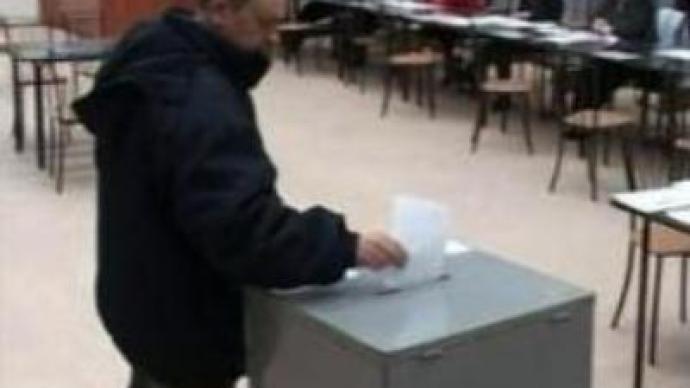United Russia wins regional parliamentary elections

Early official results suggest that the pro-Kremlin party, United Russia, has romped home in the regional parliamentary elections that took place in Russia on Sunday. United Russia is currently leading in all 14 regions.
March 11 was a major voting day across the country, with more than 70 federal entities in Russia holding local elections at different levels. They are widely considered a rehearsal for the country's State Duma elections which will take place in December. “Sunday's local parliamentary elections are considered to be and they were, in fact, a sort of primaries as they are understood in Russia – preliminary elections which predetermine the elections on a higher level and I believe that the results of the Duma campaign in December will not be much different from the outcome of this campaign. We can, by dividing the summary result of every party by 14, get the national average for United Russia, Fair Russia, SPS, etc. The December election result will be more or less like this average. There is no doubt about this. United Russia is likely to get 43-45%, the Fair Russia party 15-17% and so on,” noted Vitaly Ivanov, political analyst from the Political Research Center.Around a third of the country's electorate was involved in the voting. Certain new regulations have helped to improve the election process. “We have adopted a new rule that forbids any criticism when the candidate appears on air. This was a great improvement in the situation with the elections in the Russian regions. It helped to eliminate the so-called ‘black PR’ techniques that some of the candidates were using,” said Aleksandr Veshnyakov, Head of the Russia's Central Election Commission.The four major parties battling for seats – United Russia, Fair Russia, the Communists, and the populist LDPR – have won seats in the local legislative bodies in the major part of the regions. If a party receives less than 7% of the votes, those results are discarded. United Russia appears to have a strong showing in 13 out of the 14 regions that went to the polls to choose legislators for local assemblies. Preliminary results show the centre-left Fair Russia Party, which has close ties to the Kremlin, has won the majority in Stavropol's Regional Parliament.Russia's centre-right SPS is also tallying above 7% in 5 regions. St Petersburg: voting without Yabloko partySt Petersburg was one of the regions that went to the polls on Sunday. Polling stations across the city opened at 8 a.m., as people of St Petersburg came to voting booths to elect new members of the regional parliament. United Russia, Fair Russia, Patriots of Russia, Liberal democrats, the Communist party and the Union of Right Forces were the choice. There could have been 7, but the Yabloko party has been suspended from the elections by the order of the St Petersburg Election Commission for errors made in lists of voters. Yabloko leaders called for their supporters to vote for all parties on the list making the ballots invalid. The party appealed to Russia's Supreme Court. But the judges ruled that the decision of St Petersburg's election commission stood. St Petersburg's regional budget has grown rapidly over the past few years. As the city participated in a number of domestic and international projects, and even hosted the G8 summit in 2006, and its profile has also risen significantly. The new legislative assembly might get a lot more power, but with that comes the responsibility to keep the region's status high. Being Russia's second largest city and unofficially, the country's second capital, St Petersburg reflects the overall tendencies in Russia's politics.
You can share this story on social media:












